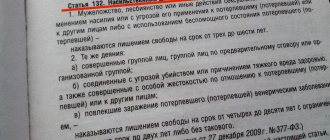Currently, according to the Criminal Code of the Russian Federation, sexual acts are punished quite severely. Relatively recently, the article threatened such acts only if it was possible to prove coercion into intimate same-sex relationships by a man. But recently the laws have become fairer and stricter, all representatives of our society are equally protected, gender does not play a role.
General understanding
According to the Criminal Code, acts of a sexual nature punishable under Article 132 relate to coercion into intimate same-sex relationships, as well as various coercions in which the aggressor resorts to violence or threatens it. At the same time, the victim (of any gender) is in a helpless state at the time of such actions. The article also punishes behavior in which the offender forced others to engage in sexual activity, taking advantage of the victim’s helplessness.
Of course, under other articles, acts of a sexual nature that fall into the categories of rape and unlawful acts are also punishable. When a victim contacts law enforcement agencies, the investigator selects the most appropriate chapter of the Criminal Code to open a case against the citizen who committed the crime. The acts listed above are grounds for depriving the offender of his liberty. The duration varies - at least three years, but no more than six.
Characteristics and elements of the crime
The subject of a crime can be any person who was fourteen years old . It will also be the one who persuaded or forced a person to commit this socially dangerous act who is not criminally liable due to his infancy , mental disorder or other legal grounds. The subjective side is only intentional, and the intent is direct .
The object of the crime is sexual freedom and sexual integrity. There is a lot of controversy regarding these concepts. Most often it is believed that only children have sexual integrity, and adults have sexual freedom . This understanding seems incorrect.
Sexual integrity is the right of any person not to engage in sexual intercourse without their own desire. And sexual freedom , in turn, is the right to determine one’s sexual life according to one’s own understanding within the framework of the law. It is important to emphasize that children do not legally have sexual freedom and acquire it only upon reaching the age of sexual consent - 16 years.
Every person at any age has sexual integrity .
The objective side consists of two elements:
- the perpetrator uses violence against the victim or takes advantage of his (her) helpless state;
- committing directly the actions themselves, which pursue the goal of satisfying the sexual desires of the perpetrator.
It is controversial whether any non-sexual act should be considered criminal under Article 132 if it produces sexual pleasure in the perpetrator . Most researchers rightly agree that no, it’s not worth it.
Sexual deviations are countless in their variety, therefore, if the action performed is not connected in one way or another with penetration into the natural cavities of the victim , such acts are subject to independent classification.
A crime with a formal element, that is, is over when the objective side begins to be fulfilled.
The situation is getting more complicated
It so happens that coercion to engage in sexual acts is quite often observed when the victim encounters a group of aggressive individuals. In such a situation, the law requires a more severe attitude. If a crime is committed by several people who previously agreed to do so or who organized all the conditions for the commission of an unlawful act, the court will punish the perpetrators with imprisonment for a period of at least 4 years, the maximum duration is a decade. Similar conditions apply to those who cause the victim to become infected with a sexually transmitted disease.
If sexual acts against the victim (regardless of gender) were accompanied by threats (including serious injury and murder), then the court also imposes a more severe punishment on the perpetrator. You should not count on concessions if the criminal act was committed especially cruelly. The behavior of both the injured citizen and other persons, if any, were involved in the situation, is assessed.
Other actions of a sexual nature
⇐ PreviousPage 34 of 96Next ⇒
Other grave consequences - see the material under Art. 131 of the Criminal Code of the Russian Federation
Violence or the threat of its use - see the material under Art. Art. 120, 131 of the Criminal Code of the Russian Federation
Particular cruelty - see material to Art. Art. 63, 105, 131 of the Criminal Code of the Russian Federation
Other actions of a sexual nature
Scientific interpretation
Other actions of a sexual nature are various forms of satisfying sexual passion between a man and a woman or between men, except for natural sexual intercourse and sodomy. For example, anal sex (“coitus per anum”) between a man and a woman, oral sex (“coitus per os”) between a man and a woman or between men, and a woman forcing a man to perform sexual intercourse through the use of violence or the threat of its use (Training- practical commentary on the Criminal Code of the Russian Federation / Under the general editorship of A.E. Zhalinsky. M., 2006. P. 406 (author - E.F. Pobegailo)).
ConsultantPlus: note.
Commentary on the Criminal Code of the Russian Federation (article-by-article) (edited by A.I. Rarog) is included in the information bank according to the publication - Prospect, 2011 (7th edition, revised and expanded).
Other actions of a sexual nature are any means of satisfying sexual desire between men or between a man and a woman, with the exception of natural sexual intercourse and sodomy. This could be, for example, oral sex (“coitus per os”), anal sex (“coitus per anum”), copulation between a man and a woman in a natural form if the coercion comes from the woman. Victims can be both men and women (depending on the nature of the act) (Commentary to the Criminal Code of the Russian Federation / Editor-in-chief A.I. Rarog. M., 2007. P. 233 (author - A.V. Korneeva )).
Other acts of a sexual nature include intercourse per os and per anum, which were previously classified as rape, as well as forcible sexual intercourse, where the victim is a man, and violence or threat comes from a woman (previously did not entail criminal liability) (Commentary to the Criminal Code of the Russian Federation / Responsible editor V.I. Radchenko; scientific editor A.S. Mikhlin. M., 2008. P. 215 (author - A.S. Mikhlin)).
Other actions of a sexual nature are any actions aimed at satisfying sexual passion, regardless of the gender of the persons, with the exception of natural sexual intercourse, sodomy and lesbianism. These can be imitation of sexual intercourse, anal or oral, etc. (Criminal law in the practice of the district court / Edited by A.V. Galakhova. M., 2010. P. 132 (author - S.V. Kuzmin)).
Other actions of a sexual nature should be understood as any other means of forcibly satisfying sexual needs between men, between a woman and a man, between women in other forms other than rape, sodomy and lesbianism, for example, anal or oral contact between a man and a woman, between men. These same cases should include sexual contact between a man and a woman in a natural form in the case of a woman using violence against a man, forcing him to copulate (Commentary to the Criminal Code of the Russian Federation / Editor-in-chief V.M. Lebedev. M., 2013. P. 343 (author - V.P. Stepalin)).
Judicial interpretation
I. committed sexual assault against Iva. Suppressing the victim’s resistance, he inflicted numerous blows on her head and body, causing bodily injuries, which, according to the conclusion of a forensic medical examination, were classified as minor harm to health based on a short-term disorder (lasting up to three weeks). I.’s actions were qualified by the court under Part 1 of Art. 132 of the Criminal Code of the Russian Federation (Salavat City Court of the Republic of Bashkortostan, case No. 1-121/2012).
P. was convicted, including under Part 1 of Art. 131, part 1 art. 132 of the Criminal Code of the Russian Federation. Realizing the criminal intent to commit rape and violent acts of a sexual nature, P., in order to overcome the resistance of the victim G., caused her bodily injuries in the form of bruises on the neck extending to the scalp, accompanied by the development of neurotic depression, which, according to the conclusion of the forensic medical examination, caused harm to health of moderate severity (Altai Regional Court, case No. 233/2012).
Article 133. Compulsion to perform actions of a sexual nature
Other actions of a sexual nature - see the material under Art. 132 of the Criminal Code of the Russian Federation
Financial or other dependence of the victim (victim) - see also the material to Art. 117 of the Criminal Code of the Russian Federation
Financial or other dependence of the victim
(victim)
Scientific interpretation
Another dependence means that the victim is fully or partially dependent on the perpetrator or, for example, lives in his living space. Another dependence may be, for example, official or arise in the learning process between a teacher and a student or between a victim and an official authorized to perform official actions in the interests of the victim. The use of financial or other dependence for the purpose of sexual intercourse, sodomy, lesbianism or other acts of a sexual nature constitutes coercion only in cases where the perpetrator threatens to infringe on the legitimate interests of the victim, for example, dismissal from work, a reduction in salary, deprivation of housing, refusal to give a positive assessment subject to the necessary knowledge, and does not promise to provide benefits and advantages. Just one proposal to perform those specified in Art. 133 of the Criminal Code of the Russian Federation, actions in the presence of material and other dependence do not constitute this crime (Commentary to the Criminal Code of the Russian Federation / Editor-in-chief A.I. Rarog. M., 2004. P. 235 (author - A.V. Korneeva) ).
Minor children, elderly parents, and other disabled dependents who have no other sources of income may be financially dependent (Commentary to the Criminal Code of the Russian Federation / Responsible editor: V.I. Radchenko; scientific editor: A.S. Mikhlin. M. , 2008. P. 216 (author - A.S. Mikhlin)).
Financial dependence is being in full or partial, but significant dependence on the perpetrator on legal grounds or with his voluntary consent (Agafonov A.V. Sexual crimes. M., 2009. P. 235).
Financial dependence means that the victim is dependent (fully or partially) on the perpetrator on the grounds established by law (for example, the financial dependence of a minor stepson on his stepfather, a stepdaughter on her stepmother).
Other dependence of the victim characterizes the restriction of the independence of the victim in any other area of his legal rights and interests, except for material ones. Such dependence may arise due to official relations, the endowment of power relations with the perpetrator, or due to other circumstances (for example, the dependence of a student on a teacher, an athlete on a coach, a patient in need of care on a health worker) (Special Part of the Criminal Code of the Russian Federation. Commentary Judicial practice. Statistics / Under the general editorship of V.M. Lebedev; Responsible editor: A.V. Galakhov. M., 2009. P. 142 (author - E.F. Pobegailo)).
Financial dependence means that the victim (victim) is dependent on the guilty person, lives in his living space without having his own, is his debtor, heir, etc.
Other dependence means that the victim (victim) is in any other, for example official, dependence on the perpetrator. Service dependence is associated with the subordination of the victim (victim) to the guilty person in the service. In addition to official dependence, other dependence may arise in the case of guardianship, trusteeship, etc. (Commentary to the Criminal Code of the Russian Federation / Edited by V.T. Tomin, V.V. Sverchkov. M., 2010. P. 441 (author - Yu.V. Golovlev)).
Financial dependence is being in full or partial, but significant dependence on the perpetrator on legal grounds or with his voluntary consent.
Other dependence is any other dependence, except material, characterized by the lack of full or partial independence, freedom, the presence of subordination in service, work or study, etc. (Commentary to the Criminal Code of the Russian Federation (article-by-article) / Edited by A.I. Chuchaev. M., 2010. P. 376 (author - A.I. Chuchaev)).
Financial dependence refers to the fact that the victim (victim) is fully or partially dependent on the perpetrator, living in a living space that belongs to him, etc. on the basis of the law or with voluntary consent.
Other dependence is understood as any other, but not material, dependence, subordination, control over work, service, study, family dependence, etc., limiting the freedom of choice, for example, between a boss and a subordinate, between a teacher and a student, between an employee and the applicant, between the accused and the investigator, between the athlete and the coach, etc. (Commentary to the Criminal Code of the Russian Federation / Responsible editor: V.M. Lebedev. M., 2013. P. 345 (author - V.P. Stepalin)).
Judicial interpretation
The cassation court overturned the verdict in terms of convicting the person under Art. 133 of the Criminal Code of the Russian Federation with the termination of the case in this part for lack of corpus delicti.
The court found Sh. guilty of committing indecent acts. Investigative authorities qualified his actions under Art. 135 of the Criminal Code of the Russian Federation, but the court reclassified them to Art. 133 of the Criminal Code of the Russian Federation, motivating their decision by the fact that by the time the crime was committed the victims had reached 14 years of age. At the same time, the court did not take into account that the disposition of Art. 133 of the Criminal Code of the Russian Federation connects the presence of the composition with specific actions of a sexual nature, to the commission of which the guilty person forces the victims, and not just under threat, as indicated in the verdict, but by blackmail, threats of destruction, damage or confiscation of property, or using the financial or other dependence of the victims .
The convict did not use this method of influencing the victims, therefore, there is no corpus delicti of this crime (Review of judicial practice of the RF Armed Forces for the first quarter of 1998. Determination N 45-097-97 // ATP “ConsultantPlus”).
Ch. was convicted of committing six counts of forcing his 16-year-old daughter to have sexual intercourse using another addiction of the victim. Ch., in order to obtain his daughter’s consent to have sexual intercourse, abusing his parental rights, realizing that he had a psychological impact on his daughter, expressed his intention to actually infringe on her rights and legitimate interests by prohibiting free movement, meetings and communication with friends, acquaintances during for a long period of time in the event of her refusal to have sexual intercourse with him (Judicial District No. 3 of the Zheleznodorozhny Administrative District of Kursk, Case No. 1-11/3-2011).
G. was convicted by the court under Part 4 of Art. 290, art. 133 of the Criminal Code of the Russian Federation. As an investigator of the Federal Drug Control Service for the Republic of Bashkortostan, during meetings with Yu. he repeatedly demanded that she engage in sexual intercourse with him under the threat of charging her husband with committing a more serious crime (Armed Forces of the Republic of Bashkortostan, case No. 2-28/2011).
Article 135. Depraved acts
Depraved acts
Depraved acts
Scientific interpretation
Depraved actions are those that consist of satisfying the sexual passion of the guilty person, other persons, or those pursuing the goal of arousing or satisfying the sexual instinct of a minor. These include exposing the genitals in the presence of a child, touching the child’s genitals with the penis, masturbation in the presence of a girl, forcing a child to touch the genitals of the perpetrator, etc. So-called lesbian love, when a minor is chosen as a partner, is covered by this crime.
Depraved acts can be expressed in the commission of sexual intercourse (both in natural and perverted form) in the presence of a minor, as well as conversations of a rough sexual nature (Commentary to the Criminal Code of the RSFSR / Responsible editor: V.I. Radchenko; scientific ed. A.S. Mikhlin, I.V. Shmarov. M., 1994. P. 226 (author - S.I. Nikulin)).
These actions are of a sexual nature, aimed at satisfying the sexual lust of the perpetrator or at arousing sexual desire and interest in sexual life in the victim. These actions can be both physical and mental. Physical indecent acts consist of manipulations of a sexual nature, for example, indecent touching (stroking the genitals), inducing masturbation (including by inserting fingers into the vagina), performing sexual acts in the presence of minors, exposing and demonstrating genitals in front of them, etc. Intellectual debauchery comes down, in particular, to cynical conversations on sexual topics, showing pornographic images, giving literature to minors, videotapes that can cause sexual arousal in them, etc. (Educational and practical commentary on the Criminal Code of the Russian Federation / Under the general editorship of A.E. Zhalinsky. M., 2006. P. 411 (author - E.F. Pobegailo)).
Depraved acts can be physical (exposing the genitals of a minor, touching them, exposing the genitals of the perpetrator, committing various indecent acts). These actions must be carried out without the use of violence.
Depraved acts can be of an intellectual nature (demonstration of pornographic objects, holding cynical conversations on sexual topics, showing pornographic films and tape recordings of the same nature) (Commentary to the Criminal Code of the Russian Federation / Editor-in-chief V.M. Lebedev. M., 2007 pp. 359 - 360 (author - A.N. Ignatov)).
The crime in question is realized in the non-violent commission of depraved acts, i.e. actions of a sexual nature aimed at satisfying the sexual passion of the guilty person, as well as arousing sexual desire in the victim and not being sexual intercourse, sodomy or lesbianism. Depending on the way of expression, depraved actions are divided into two types: intellectual and physical. The first type includes: conducting conversations with sexually cynical content, familiarizing with pornographic literature, playing relevant audio and video recordings, demonstrating other porn products (postcards, photographs, drawings, etc.), inciting teenagers to have sexual contacts with each other. The second type includes indecent positions and touching, exposure of the victim's genitals, demonstration of one's own genitals (exhibitionism), artificial stimulation of erogenous zones (masturbation) or sexual contact (for example, sexual intercourse, sodomy, lesbianism) in the presence of a teenager. Based on the systematic interpretation of the criminal law (Articles 135, 132 - 134 of the Criminal Code of the Russian Federation), these include all other (besides sodomy) manifestations of male homosexuality (for example, coitus per os) and all other (besides sexual intercourse) manifestations of heterosexual activity in relation to persons under 16 years of age (for example, coitus per anum, narvasadat, frottazhi, etc.) (Konyakhin V. Depraved actions // Legality. 2008. No. 12).
Non-violent indecent acts include exposing the genitals of the victim or the perpetrator in the presence of the victim, touching the genitals of the victim, performing sexual intercourse in the presence of a minor, breaking the hymen with one's hand, inducing minors to commit sexual acts among themselves. Depraved acts may also consist of showing pornographic films, photographs, etc. to minors. (Commentary to the Criminal Code of the Russian Federation / Responsible editor: V.I. Radchenko; Scientific editor: A.S. Mikhlin. M., 2008. P. 217 (author - A.S. Mikhlin)).
Depraved actions are those aimed at satisfying the sexual passion of the guilty person or at arousing unhealthy sexual desire in a minor, not related to sexual intercourse, sodomy, lesbianism or other actions of a sexual nature. Such actions are characterized by the fact that they awaken unhealthy sexual interest in minors, have a negative, corrupting effect on their development and education, forming the rules of obscene, immoral behavior in relations between the sexes, etc.
Depraved acts can be both physical and intellectual.
Typical physical lewd acts are exposing the genitals of the perpetrator or victim, touching them, groping them, taking obscene forms, committing obscene gestures, sexual intercourse, other acts of a sexual nature in the presence of a minor, inducing onanism, masturbation, etc.
Typical depraved acts of an intellectual nature are displaying pornographic materials, objects, audio, film or video recordings, images of a pornographic nature, reading pornographic literature, conducting conversations, conversations, stories on sexual topics of a cynical nature, etc. (Commentary to the Criminal Code of the Russian Federation / Responsible editor: V.M. Lebedev. M., 2013. P. 350 - 351 (author - V.P. Stepalin)).
⇐ Previous34Next ⇒
Special occasion
According to a special scale they are assessed in Art. The Criminal Code of acts of a sexual nature described above, if the victim was a minor citizen of any gender, and also, as a result of the crime, the victim was infected with HIV. The court also evaluates other grave consequences, including tangible harm to health (mental, physical). In such a situation, the offender will be sent to prison for at least 8 years, the maximum term is 15 years. In the future, having been released from places of forced confinement, such a person will not have the right to occupy certain positions and conduct a number of social and labor activities for two decades. Additional restriction of freedom is also possible - up to two years.
If acts of a sexual nature with a person of any gender caused his death, the offender will be punished by imprisonment for 12-20 years. Similar sentences are awarded to those whose victims were persons under fourteen years of age. Upon release from prison, the offender will not have the right to work in a number of positions or engage in certain types of activities. This condition will dominate life for two decades. Additional restriction of freedom applies for two years.
Consequences
What is the responsibility for a crime? In its simple form, without qualifying features, this act is punishable by imprisonment for a term of 3 to 6 years.
Also, serious crimes include acts provided for in parts two and three of Article 132 of the Criminal Code of the Russian Federation, but require a more severe punishment .
A crime can be especially serious if:
- the death of the victim was caused by negligence;
- the victim is a minor;
- the perpetrator already has a criminal record for sexual offenses where the victim was a minor.
Additionally, the court may impose one more punishment to the main one: prohibit the offender from engaging in any specific activity or holding a position .
The Criminal Code of the Russian Federation provides that for a number of especially dangerous crimes, responsibility begins at the age of fourteen.
These include the crime in question. This means that if a minor aged 14 to 18 years is found to be the subject of a crime, sentenced under general conditions on an equal basis with adults.
In practice, the courts, of course, take into account the young age of the offender and may impose a suspended or minimum sentence if the offender is characterized positively and has not been previously noticed in antisocial activities. But it is important to understand that this is not the direct responsibility of the court, but its right.
To learn from your mistakes
Quite often in the practice of judicial authorities there are cases of rape, violent acts of a sexual nature by a person who has previously been convicted of illegal acts of this kind. If the guilt of the repeat offender is proven, the court chooses imprisonment for 15-20 years as punishment. Upon release from such a place, a citizen will not have the right to hold a number of positions for another two decades, as well as to conduct certain types of social activities and labor activity. In some cases, the court may decide in favor of life imprisonment if circumstances favor such a conclusion.
Varieties
Violent acts of a sexual nature fall under Article 132 of the Criminal Code of the Russian Federation. The types of such acts are clearly identified here and can be divided into three categories.
- sodomy - forced sexual intercourse between men, committed by penetration of the perpetrator into the anus of the victim;
- lesbianism is a special form of homosexuality committed by women in relation to representatives of the same sex: contact with the genitals, imitation of the act of intercourse;
- other actions - this includes any form of sexual activity with the exception of rape and homosexual contacts.
Important! If same-sex sexual contact or unnatural forms of intercourse occur by mutual agreement of the partners, the elements of a crime are not visible.
Security and justice
Some time ago, acts of a sexual nature were considered criminal by law only in cases where the victim was forced into same-sex relations by a man. Not long ago, a new article, number 132, was introduced, filling the gap and providing legal protection to all citizens. In our country, intimate personal freedom is guaranteed to everyone, regardless of biological characteristics or beliefs.
Previously, legislation required the punishment not just of sexual acts, but of violent ways of satisfying the needs of certain categories of citizens. The wording of the laws is such that a person who does not want to enter into relationships that are unacceptable to him is protected by law from involving himself in them against his own will. This helps preserve life, mental and physical health. Every citizen can count on spiritual integrity.
Crime: signs
The court assesses whether rape or acts of a sexual nature took place, based on the signs of the event that occurred. Subjective and objective ones are subject to analysis equally. Objects (additional, main), subjects, signs of the objective side are studied.
In order for an act to be classified as rape or acts of a sexual nature, the act must include threats of violence or the commission of such. In Article 131 and earlier there was a similar provision that considered only rape. In the updated 132, it is somewhat expanded, covering various cases of unlawful sexual acts. At the same time, Article 132 is intended to punish for all violations of the law that do not fall under Article 131; at the same time, the same crime is not assessed in two ways at once, but the clause of the law that is more suitable for the circumstances is selected.
Rape
Rape
(Article 131 of the Criminal Code).
The object
of the crime is sexual integrity and sexual freedom of the individual; additional - human life and health. Only female victims can be victims of rape.
Objective side
Rape is characterized by sexual intercourse between a man and a woman, committed against her will, with the use of violence or the threat of its use, or taking advantage of the helpless state of the victim.
Sexual intercourse should be understood as sexual intercourse in a natural form. Satisfaction of sexual desire in other, so-called perverted forms using the same methods is subject to qualification under Art. 132 of the Criminal Code. Sexual intercourse during rape must occur against the will of the victim, therefore in all cases it should be established whether the woman really did not want to have sexual intercourse.
So, Ya., having come to K.’s apartment in the evening, where he temporarily lived, invited 18-year-old Olga K. to have sexual intercourse with him. The latter agreed, but later got scared and told her mother about everything, who persuaded her daughter to file an application with the prosecutor's office to bring Ya. to justice for rape. Of course, there is no crime in Ya’s actions, since the sexual relationship was mutually voluntary.
The law names methods of rape as mandatory signs of the objective side of the crime. This is the use of violence, threats of its use, or taking advantage of the helpless state of the victim. As follows from the text of Art. 131 of the Criminal Code, violence and threats of its use can be addressed not only to the woman - the direct victim of rape, but also to other persons, whose circle is not limited by law. These could be her relatives, people close to her, as well as other persons against whom threats against the perpetrators can break a woman’s resistance.
Violence under Part 1 of Art. 131 of the Criminal Code can be expressed in beatings, causing minor or moderate harm to a person’s health, tying up the victim, or rendering him unconscious. Additional qualifications under Art. 112 and 115 of the Criminal Code are not required.
The content of the threat is limited by law only to the promise to immediately use physical violence against the victim or other persons. If the content of the threat is different, for example, to defame the victim or destroy her property, the act should be regarded as coercion to acts of a sexual nature (Article 133 of the Criminal Code). If the perpetrator promises to use violence in the future and the woman, fearing his execution, agrees to have sexual intercourse, there is no element of rape. The threat must be real and real.
The use of a helpless state involves the rape of a victim who, due to certain circumstances, is unable, for example, serious illness, physical disabilities, old age, to resist the perpetrator (physical helplessness) or to understand what is happening to her, for example, as a result of mental illness, being a minor, unconsciousness, etc. (mental helplessness).
The state of alcohol or drug intoxication can be recognized as a helpless state only if its degree was such that it deprived the victim of the opportunity to be aware of the surrounding situation, understand the meaning of the actions committed by the offender or resist him (clause 5 of the resolution of the Plenum of the Supreme Court of the Russian Federation “On judicial practice in cases of rape "dated April 22, 1992. For the qualification of the act, it does not matter whether the perpetrator brought the victim into a helpless state or she was helpless regardless of his actions. When using the helpless state, it is necessary to establish that the perpetrator was aware of the helplessness of the victim, otherwise he will not may be prosecuted for rape.
If a person, wanting to have sexual intercourse with a woman, uses other methods of influencing her (for example, deception - a deliberately false promise to subsequently formalize a marriage relationship with her), there is no element of rape.
The crime is considered completed from the moment the sexual intercourse begins, regardless of whether the sexual intercourse was completed by the perpetrator in the physiological sense.
From the subjective side
the crime is characterized by guilt in the form of direct intent.
The subject
is a physically sane male person who has reached the age of 14.
Part 2 Art. 131 of the Criminal Code provides for liability for the following qualified types of rape:
a) committed repeatedly (same repetition) or by a person who has previously committed violent acts of a sexual nature (same repetition); Repeated rape must be distinguished from continued rape. If the commission of several violent sexual acts with the victim is carried out with a small gap in time and was covered by the single intent of the perpetrator, there is no sign of repetition;
b) committed by a group of persons, a group of persons by prior conspiracy or an organized group. Rape is qualified as committed by a group when the persons who took part in it acted in concert against the victim without entering into a prior criminal conspiracy, and co-perpetrators of rape are not only persons who committed a violent sexual act, but also those who contributed to this through the use of physical or mental violence to the victim. When rape is committed by a group of persons by prior conspiracy, an agreement between the participants in the crime to commit it must take place before the start of the criminal act. At the same time, the actions of organizers, instigators, and accomplices should be qualified with reference to Article 33 of the Criminal Code. Organized group rape occurs when it is committed by a stable group of individuals who have previously united to commit one or more rapes.
If rape is committed by a group consisting of two persons, one of whom cannot be the subject of rape due to, for example, not reaching the age of criminal responsibility or insanity, the actions of the other should be qualified as committed by a group of persons.
So, for committing gang rape under Part 3 of Art. 117 of the Criminal Code (now clause “b”, part 2 of Article 131 of the Criminal Code) T was convicted. The crime was committed under the following circumstances. A., being heavily intoxicated, returning home from a neighboring village, fell at a railway crossing. T. and 13-year-old U. picked her up and took her along the road to the village. On the way, T. had the intention of taking advantage of her helpless state and performing sexual intercourse with A. He informed U. of his intention and received the latter’s consent to jointly commit the act. They took A. to a haystack, undressed her, and T. had sexual intercourse with her. U. also tried to have sexual intercourse with A., but for physiological reasons he was unable to carry out his intention.
c) accompanied by a threat of murder or infliction of grievous bodily harm, as well as committed with particular cruelty towards the victim or other persons. The threat of murder or infliction of grievous bodily harm is understood as direct statements expressing the intention to immediately use physical violence of appropriate intensity and nature against the victim or other persons, but also other threatening actions of the perpetrator, for example, a demonstration of weapons. The threat must be perceived by the victim as realistically feasible, and immediately. In the case of statements of an unspecified nature, in order to assess their content, it is necessary to find out all the circumstances, the environment in which they were expressed, as well as the perception of such threats by the victims. Particular cruelty, as noted above, is a legal category that characterizes the method of committing a criminal act. It means such an impact on the victim that entails causing him special physical or moral suffering (for example, the manifestation of sadism towards the victim). The perpetrator is aware that he is using particularly cruel methods of influence towards the victim or other persons, thereby causing them special suffering; d) resulting in infection of the victim with a venereal disease. To impute this type of rape, it is necessary to establish the existence of a causal connection between the rape and the resulting harmful consequence in the form of the victim contracting a venereal disease, as well as the awareness of the perpetrator of the presence of this disease; e) rape of a known minor. In the situation under consideration, the victim is a girl aged 14 to 18 years. The culprit is liable under clause “d”, part 2 of Art. 131 of the Criminal Code, provided that he reliably knew about the minority of the victim, as the law directly indicates, using the term “knowingly”.
The law classifies rape as particularly qualified if it negligently resulted in the death of the victim (clause “a”, Part 3, Article 131 of the Criminal Code); which, through negligence, resulted in the infliction of serious harm to the health of the victim, her infection with HIV infection or other grave consequences (clause “b”, part 3 of article 131 of the Criminal Code); as well as rape of a victim who is known to be under 14 years of age (clause “c” of Part 3 of Article 131 of the Criminal Code).
The elements of the crime provided for in paragraph “a” of Part 3 of Art. 131 of the Criminal Code, covers causing the victim’s death by negligence. The murder of the victim requires additional qualification under paragraph “k” of Part 2 of Art. 105 of the Criminal Code. Moreover, if the murder was committed during rape, the actions of the perpetrator must be qualified under paragraph “b” of Part 3 of Art. 131 as rape resulting in grave consequences, and paragraph “k” of Part 2 of Art. 105 of the Criminal Code. If the murder was committed after rape in order to conceal the crime or for reasons of revenge for the resistance offered by the victim during forced sexual intercourse, the actions of the perpetrator should be qualified under paragraph “k” of Part 2 of Art. 105 of the Criminal Code and the relevant part of Art. 131 CC.
Reckless death in rape must be the result of the actions of the perpetrator, i.e. must be in a causal relationship with them. The same requirement also applies to the description of rape, which through negligence resulted in the infliction of grievous harm to the health of the victim.
The subjective attitude of the perpetrator to the fact of death or serious harm to health in the situations under consideration appears in the form of negligence, in the form of frivolity or negligence. Intentional infliction of grievous harm, as well as murder, requires additional qualification under the relevant part of Art. 111 of the Criminal Code.
Other grave consequences of rape are an evaluative concept, a question of fact that is decided by the court in each specific situation of the commission of the act in question. But in any case, the consequences recognized by the court as grave must be in a causal connection with the rape committed. Such consequences should include, in particular, the suicide of the victim, mental illness resulting from rape, the death of the victim that occurred in the process of her attempt to avoid sexual violence by the perpetrator.
Thus, the presence of a grave consequence can be stated in the following situation: after she was raped by two criminals, S., fleeing from new violence on their part, tried to get out of the apartment on the sixth floor in which the crime was committed using the fire escape. However, being greatly weakened as a result of the injuries caused to her, she fell and fell to her death.
Infection of the victim with HIV infection can qualify rape, provided that it was in a causal connection with forced sexual intercourse and that the perpetrator was aware of the presence of this disease.
Imputation of the sign provided for in paragraph “c” of Part 3 of Art. 131 of the Criminal Code, perhaps if the perpetrator reliably knew that the victim was under 14 years of age. A conscientious misconception by the perpetrator regarding the age of the victim excludes liability, taking into account the qualifying feature under consideration.
It is important to know
If we compare the punishment for rape and other acts of a sexual nature, it is noticeable that for the law such illegal acts are assessed as approximately equal. From the point of view of many lawyers, this approach is correct, since it helps ensure public safety and the rights to sexual freedom of citizens. However, when analyzing a crime, the prosecutor’s task is to carefully study all aspects of what happened in order to classify the event under the correct article in order to avoid incorrect acquittal of the guilty citizen.
As can be seen from Article 132, the object of other actions of a sexual nature (relative to rape) can be equally representatives of both sexes. Punishment under this provision of the law is subject to a man whose victim was male, a woman whose victim was, accordingly, from the fair half of humanity. The legislation also considers hermaphrodites who have suffered from the unlawful acts of a criminal.
Object of crime
The law punishes not only coercion into intimate sexual intercourse and violence, but also other actions of a sexual nature. This (rather vague in the eyes of a wide audience) formulation usually includes forced oral contact, imitation of relationships, and other forms that are assessed by some citizens as vivid perversions. Both coercion into same-sex contact and other actions become the reason for opening a case if they occurred when the victim did not want to be a participant in an intimate act. If the injured citizen was forced by threats, violence, if the criminal took advantage of his helplessness, to protect his rights it is necessary to turn to the legal authority.
Currently, the law evaluates actions of a sexual nature in such a way that the composition of a criminal act is formal. This means that punishment awaits the offender whose guilt is proven, regardless of whether he managed to satisfy his needs or the process was interrupted.
Composition of the crime
Let's consider the key aspects of violent actions that create the elements of a criminal offense.
The object is sexual relationships and independence. Any citizen is given the freedom to choose a sex partner, and no one has the right to force him to have intimate relations without obtaining voluntary consent. In the group of aggregate objects of crime, one can highlight dignity and honor, psychological development (if we are talking about minors), health and life when particularly serious forms of violence occur.
Objective form - the actions of an attacker aimed at indulging his sexual needs, satisfying them in an unnatural way.
Subject is any capable citizen over 14 years of age.
The subjective form is premeditation: direct intent can always be traced in the actions of the attacker.
The crime is defined as having occurred from the moment of the violent sexual act of the accused towards the victim.
Important! Children are not given freedom of sexual choice. This right appears only after overcoming the 16th birthday threshold.
Realities and statistics
Acts of a sexual nature are a problem that has no boundaries. Violence is about 90% of all acts that violate laws related to sexual inviolability, and only slightly less than half of those occurring in our country are classified under Article 132. Recently, the number of such actions has only increased from year to year by tens of percent.
Currently, the circumstances that increase the guilt of the criminal include group participation and threats, causing harm, infection with pathologies, as well as committing acts when the citizen knew in advance that his victim had not reached the age of majority. Such offenses are classified as grave. The law treats them similarly to rape. This is due to the increased danger to the public.
Features of the crime
Among similar atrocities directed against sexual integrity, violent acts stand out as a factor of increased danger. If we analyze the statistics for the country as a whole, few such crimes are committed when compared, for example, with rape.
This is due to the following reasons:
- Low percentage of requests for help from investigative authorities. Victims prefer to hush up the fact of violence, fearing publicity. As a result, criminals develop a feeling of impunity, which is an incentive to commit similar atrocities.
- More serious consequences. Sexual abuse committed in an unnatural form causes severe psycho-emotional trauma, therefore, fearing ridicule, victims do not admit that they have become victims of violence, even to close people.
It is noteworthy that representatives of the stronger sex are more vulnerable in this regard.
What about the neighbors?
In almost all European countries, acts of a sexual nature are also punishable under the Criminal Code. The standards differ somewhat in different countries, and there are a number of distinctive features that are especially noticeable in comparison with the standards adopted in our state. An analysis of such points is necessary to improve domestic legislation - this is precisely the position that some legal scholars insist on.
For example, in Bulgaria, violent acts by a man, the victim of which is a person of the same gender, are the subject of criminal prosecution under a special article written individually for such a case. Responsibility for all other offenses, except for coercion of a man by a man and rape, is spelled out in another provision of the Criminal Code. There is an obvious difference from our country, where the crimes are currently combined into only two articles. From the point of view of a number of analysts, division provides a more correct approach to illegal acts, therefore this formulation is preferable to universal articles of laws.
This is interesting
According to Bulgarian legislation, the assessment of the corpus delicti requires taking into account the commission of an unlawful act in relation to the victim, who was in a helpless state. Additionally, responsibility for bringing a person into such a state is prescribed. This formulation (as a number of experts note) is more complete and correct.
Another interesting difference between Bulgarian legislation and domestic legislation is the identification of special circumstances that increase the guilt of the rapist. These include situations where two or more minors became victims. The case is considered especially serious if, as a result of the crime, a minor citizen attempted to commit suicide.
And in Germany?
In this country, acts of a sexual nature are currently punishable under the same article that deals with rape; there are no specialized paragraphs for punishing the perpetrators of the crime. There are also no separate standards applicable to a situation where the victim and the rapist are of the same gender and both are men. The wording of the legislation is such that it can be applied to any case of coercion into an intimate act, regardless of the gender of the participants in the situation.
German legislative norms pay special attention to the relationship between the victim and third parties, and not just to the interaction with the perpetrator of the crime. The person who himself did not enter into an intimate act, but showed some activity, threatened, and used violence to coerce, becomes a performer. According to the laws of our country, such a person will be tried as an accomplice in the case.
Austria: its own characteristics
In this country, two paragraphs of the Criminal Code have come into force, one of which deals with rape, and the second provides punishment for other acts of a sexual nature. If you pay attention to the specific wording, you will notice that there is no connection to the gender of the participants in the situation. The disposition applies equally to all options, including coercion of a man by a man and a woman by a woman.
A special clause of the law concerns coercion into such relationships of a spouse or a person with whom the offender is in an unofficial marital relationship. The presence of an official complaint from the victim becomes the basis for starting criminal proceedings. Interestingly, many activists propose to introduce a similar clause into the current legislation of our country. In addition, there are suggestions that it is impossible to complete the paperwork on the basis of reconciliation of the parties.









